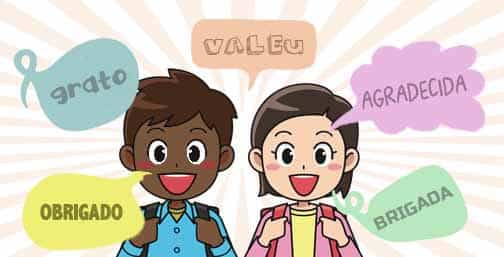Blog
How to say Thank You in Portuguese
- Thursday July 8th, 2021
- Posted by: Amanda Ennes
- Category: Learn the Portuguese Language and Portuguese Grammar

There are different ways to say Thank You in Portuguese. Some are formal and some are informal. Once you learn them, you can better assess which form you should use in each of the situations in your life.
In this post, we will teach you how to say Thank You in Portuguese and also You’re Welcome in Portuguese.
Table of Contents
ToggleHow to say Thank You in Portuguese
Just like in English, there are different ways to say Thank You in Portuguese. There are formal and informal ways to express gratitude to someone, and you can choose which expression to use in each situation.
1) Obrigado/Obrigada
This is the most common way to say Thank You in Portuguese. Men should say ‘Obrigado’, with an ‘O’ at the end. Women should say ‘Obrigada’, with an ‘A’.
Example:
– Oi Marina, eu trouxe um presente para você. (Hi Marina, I brought you a present.)
– Obrigada. (Thank you.)
2) Muito obrigado/Muito obrigada
You may add the word ‘Muito’, which means ‘A Lot’ in front of the words ‘Obrigado’ or ‘Obrigada’ to intensify the gratitude.
Example: Muito obrigada pelo novo cargo na empresa. (Thank you so much for the new position in the company.)
3) Brigado/Brigada
‘Brigado’ is the short form for ‘Obrigado’. Brazilians tend to omit the ‘O’ at the beginning of the words ‘Obrigado’ and ‘Obrigada’ in day-to-day conversations. It is important to notice this is only applied in spoken Portuguese, as the words ‘Brigado’ and ‘Brigada’ do not really exist in proper grammar. However, saying ‘Brigado’ or ‘Brigada’ is extremely habitual in conversations in Brazil and you will probably hear it often.
Example: Mãe, pode pegar um copo de água para mim? Brigado! (Mom, can you bring me a glass of weather? Thanks!)
4) Agradecido/Agradecida
This is a formal way to express gratitude in Portuguese. It is used more often in formal situations, especially if you want to impress someone older or important. Just like ‘Obrigado/Obrigada’, there are different forms to say these words depending on if you a man or a woman.
Example:
– Roberto, gostaria de te convidar para a cerimônia de premiação do cinema nacional. (Roberto, I would like to invite you to the award event.)
– Agradecido.
5) Grato/Grata
Saying ‘Grato’ (for men) and ‘Grata’ (for women) is just another formal way to say thank you. This is also a way to express gratitude in writing form, like in emails or formal letters.
Example:
Envio meu currículo para consideração na vaga de professor. (I am sending you my CV to be consider in the teaching position.)
Grato, (Thank you)
Júlio
6) Valeu
‘Valeu’ is a very popular slang in Portuguese, used everywhere in Brazil. You will hear it a lot while talking to people on the streets, friends, vendors, and more. It is often used in informal settings.
Example:
– Oi, Clara. Aqui está sua caneta. (Hi Clara, here is your pen.)
– Valeu! (Thanks!)
How to say You’re Welcome in Portuguese
Now that we have already learned the different ways to say Thank You, it is time to see how to say You Are Welcome in Portuguese as well.
1) De nada
‘De nada’ is the most usual way to respond when someone thanks you in Portuguese.
Example:
– Obrigada por me dar uma carona. (Thank you for the ride.)
– De nada. (You’re welcome.)
2) Por nada
This is just another way to say ‘De nada’.
Example:
– Minha mãe pediu para te agradecer pelo bolo que você nos enviou. (My mom asked me to thank you for the cake you have sent us.)
– Por nada. (You’re welcome.)
3) Não há de quê
This is a formal way to say You’re Welcome in Portuguese. Even though not many people use this kind of response anymore, it is still common among older or formal people.
Example:
– Estou muito grato pela sua ajuda na reunião. (I’m very thankful for your help during the meeting.)
– Não há de quê. (You’re entirely welcome.)
4) Imagina!
To respond ‘Imagina!’ when someone thanks you is a way of saying there is no need to be thanked for. It is a polite way to say you are glad to help.
Example:
– Muito obrigado por me ajudar a trocar o pneu do carro. (Thanks a lot for helping me with my flat tire.)
– Imagina! (Don’t mention it!)
5) Sem problema!
Another way to say you do not mind helping.
Example:
– Aqui está o vestido que você pediu emprestado. (Here is the dress you asked for.)
– Obrigada. (Thank you.)
– Sem problema! (No problem!)
6) Obrigado você/Obrigada você
You can also use the word ‘Obrigado(a)’ to respond to ‘Thank You’. It is a way of saying you are the one who should be grateful. It is like in English when someone thanks you and you respond by saying ‘Thank You’ emphasizing the ‘You’.
Example:
– Obrigado pela presença na minha festa. (Thank you for coming to my party.)
– Obrigada você. (Thank you.)
7) Obrigado eu/Obrigada eu
Just like the last example, people may also say ‘Obrigada eu’ or ‘Obrigado eu’.
– Muito obrigada pela visita. (Thank you for the visit.)
– Obrigada eu. (Thank you)
8) Disponha
Another formal way to say ‘You’re Welcome’ in Portuguese. By saying ‘Disponha’, you imply you are always there to help whenever the person needs it.
Example:
– Estou muito agradecido pela sua ajuda.
– Disponha.
Learn other Portuguese tips by visiting our social media and checking our hashtag #CaminhosTips. You can also check our blog posts under the category Learn the Portuguese Language and Portuguese Grammar. Study Portuguese in Rio de Janeiro with Caminhos Language Centre and learn Portuguese fast.


 Deutsch
Deutsch Français
Français Português
Português Español
Español



Muito abrigado 🤗🇧🇷👍
Estou muito grato pelas mensagens.